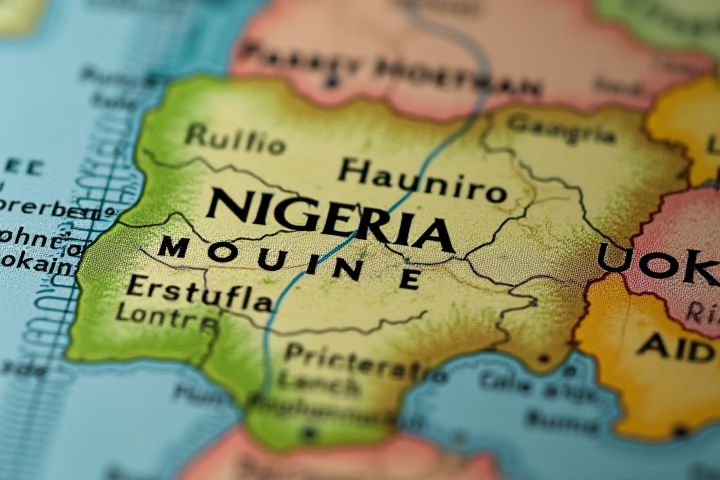
Nigeria's Gross Domestic Product (GDP) represents the total economic output of the country, making it one of the largest economies in Africa. In 2023, Nigeria's estimated GDP reached approximately $450 billion, driven by key sectors such as oil and gas, agriculture, and telecommunications. The oil sector alone contributes significantly to government revenue, accounting for over 90% of export earnings. Despite these figures, challenges like inflation, unemployment, and infrastructural deficits continue to affect economic growth. Understanding Nigeria's GDP can help you assess investment opportunities and policy changes within this dynamic market.
Largest Economy in Africa
Nigeria stands as the largest economy in Africa, with a Gross Domestic Product (GDP) surpassing $450 billion as of 2023. The nation's economy is primarily driven by the oil and gas sector, which contributes significantly to government revenue and export earnings. In addition to hydrocarbons, Nigeria's diverse sectors, including agriculture, telecommunications, and services, play vital roles in economic growth and job creation. Your awareness of Nigeria's economic landscape is essential for understanding the broader trends and opportunities within the African continent.
Oil Dominance
Nigeria's Gross Domestic Product (GDP) heavily relies on oil, which constitutes approximately 90% of its export revenues. As one of Africa's largest oil producers, the country faces the challenges of fluctuating global oil prices and the need for economic diversification. The oil sector has attracted significant foreign investment, yet it is also associated with issues such as environmental degradation and corruption. For sustainable growth, Nigeria must explore alternative industries, such as agriculture and technology, to reduce its dependency on oil.
Diversifying Sectors
Nigeria's GDP relies heavily on diversifying sectors like agriculture, telecommunications, and manufacturing to stimulate economic growth. The agricultural sector encompasses staple crops such as cassava, yams, and cocoa, which are crucial for both local consumption and export. Telecommunications has experienced explosive growth, with companies like MTN and Airtel driving increased mobile penetration and internet connectivity nationwide. Emphasizing sustainable practices within these sectors can enhance productivity and resilience, ultimately shaping Nigeria's economic landscape in the coming years.
Rising Tech Industry
Nigeria's GDP increasingly reflects the rapid growth of its technology industry, which has emerged as a key driver of economic development. This vibrant sector encompasses various sub-industries, including fintech, e-commerce, and software development, attracting both local and international investments. In 2022 alone, Nigerian startups raised over $1.5 billion, highlighting the nation's potential as an African tech hub. As digital innovation continues to flourish, you can expect significant advancements in job creation, financial inclusion, and overall economic diversification in Nigeria.
Population Impact
Nigeria's Gross Domestic Product (GDP) heavily influences its vast population, which exceeds 206 million people, making it the largest in Africa. The economy is characterized by a diverse array of sectors, including agriculture, telecommunications, and oil exports, which significantly drive economic growth. As a result, the per capita income remains low, highlighting the need for economic reforms aimed at improving living standards and reducing poverty levels. Engaging in sustainable development strategies can empower you to better understand the interplay between population dynamics and economic performance in Nigeria.
Informal Economy
Nigeria's Gross Domestic Product (GDP) heavily relies on its informal economy, which comprises a significant portion of the workforce and economic activities. This sector includes various enterprises, ranging from street vendors to unregistered micro-businesses, contributing approximately 65% to the country's total employment. The informal economy plays a vital role in providing livelihoods and fostering entrepreneurial spirit, despite facing challenges like limited access to credit and regulatory barriers. Understanding the dynamics of this sector is crucial for formulating policies that promote economic growth and enhance the overall stability of Nigeria's economy.
Agricultural Contribution
Nigeria's economy heavily relies on agriculture, which contributes approximately 24% to its Gross Domestic Product (GDP). Major agricultural products include cassava, maize, rice, and yams, positioning Nigeria as one of the largest producers of these staples in Africa. The sector also provides employment for over 70% of the population, highlighting its critical role in poverty alleviation and food security. With ongoing investments in modern farming techniques and agro-processing industries, Nigeria aims to enhance agricultural productivity and reduce dependence on oil revenues.
Trade Balance Issues
Nigeria's Gross Domestic Product (GDP) is significantly influenced by its trade balance, reflecting the relationship between exports and imports. The country is heavily reliant on oil exports, which comprise a substantial portion of its foreign exchange earnings, but fluctuations in global oil prices can lead to trade deficits. Additionally, an increasing reliance on imports for consumer goods and industrial products exacerbates trade imbalance issues, impacting economic stability. Addressing these trade balance challenges is crucial for Nigeria's economic growth and diversification, allowing for a more resilient and self-sustained economy.
Inflation Rates
Nigeria's GDP growth is intricately linked to its inflation rates, which have shown significant fluctuations in recent years. High inflation undermines purchasing power, affecting consumer spending and investment, thereby impacting overall economic productivity. The Central Bank of Nigeria employs monetary policy measures to stabilize inflation, aiming to create an environment conducive to sustainable GDP growth. Understanding these dynamics is essential for investors and policymakers who seek to navigate the complexities of Nigeria's economic landscape effectively.
Foreign Investments
Nigeria's economy is increasingly driven by foreign investments, pivotal in enhancing its GDP growth. The nation attracts significant foreign direct investment (FDI) due to its vast natural resources, particularly oil and gas, alongside a burgeoning technology sector. As a Nigerian entrepreneur, you may find opportunities in various sectors such as agriculture, telecommunications, and renewable energy, which are drawing international attention and capital. This influx of foreign investments not only stimulates economic development but also fosters job creation and infrastructure improvements across the country.
